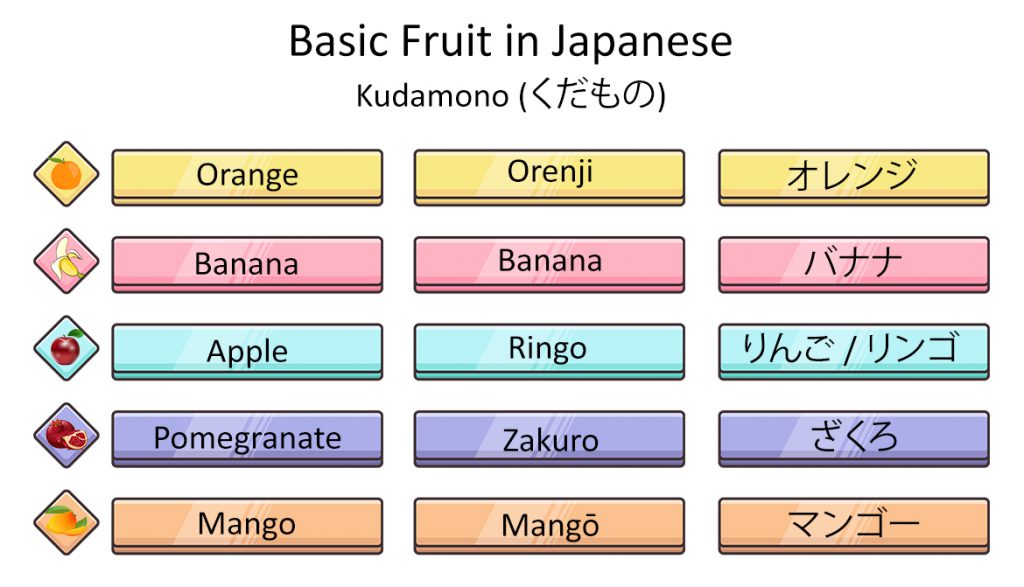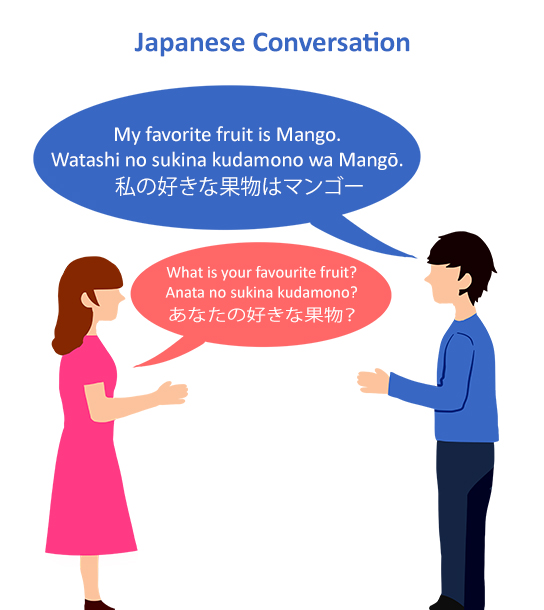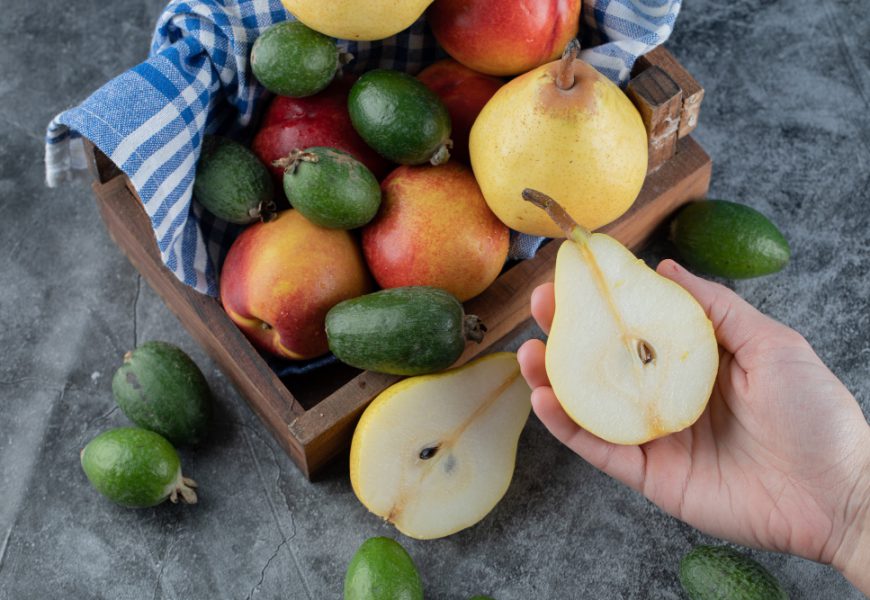No matter where you go, no matter the country, fruit is something everyone has in common; only the names will probably be different. In this blog, we are going to focus on what we call various fruit in Japanese.
Fruits contain vitamins and minerals, from vitamins A (beta-carotene), C, and E to phosphorous and folic acid, among many others, that are needed to maintain good health. It is no wonder that many people in many countries offer them to their god(s) as sacrifices.
In Japan, there is an annual Buddhist event that lasts for several days where the Japanese people commemorate and honour their ancestors by placing fruits and other food and drinks at the graves or family altars.
Although there is a wide variety of fruits available, some of the most common Japanese fruits in Japan include Nashi (Japanese pear), Ringo (apples), Kaki (Japanese persimmons), Mikan (Japanese oranges), Kinkan (kumquat), Momo (Japanese peach), Sakuranbo (cherry), Ume (Japanese plum) and Ichijiku (fig), among others.
Japanese Fruit Names

- Fruit in Japanese – Kudamono (くだもの)
- Orange in Japanese – Orenji (オレンジ)
- Banana in Japanese – Banana (バナナ)
- Peach in Japanese – Momo (もも / モモ)
- Pineapple in Japanese – Painappuru (パイナップル)
- Apple in Japanese – Ringo (りんご / リンゴ)
- Kiwi in Japanese – Kiui (キウイ)
- Berry in Japanese – Berī (ベリー)
- Blueberry in Japanese – Buruberi (ブルーベリー)
- Watermelon in Japanese – Suika (すいか / スイカ)
- Chestnut in Japanese – Kuri (クリ)
- Pomegranate in Japanese – Zakuro (ざくろ)
- Fig in Japanese – Ichijiku (イチジク)
- Lemon in Japanese – Remon (レモン)
- Lime in Japanese – Raimu (ライム)
- Blackberry in Japanese – Burakkuberi (ブラックベリー)
- Coconut in Japanese – Kokonattsu (ココナッツ)
- Jackfruit in Japanese – Jakkufurūtsu (ジャックフルーツ)
- Tomato in Japanese – Tomato (トマト)
- Cherry in Japanese – Sakuranbo (サクランボ)
- Pear in Japanese – Nashi (なし)
- Passion Fruit in Japanese – Passhonfurūtsu (パッションフルーツ)
- Avocado in Japanese – Abokado (アボカド)
- Apricot in Japanese – Apurikotto (アプリコット)
- Mango in Japanese – Mangō (マンゴー)
- Raspberry in Japanese – Razuberī (ラズベリー)
- Guava in Japanese – Guaba (グアバ)
- Papaya in Japanese – Papaiya (パパイヤ)
- Raisins in Japanese – Rēzun (レーズン)
- Grapes in Japanese – Budou (ぶどう)
- Citron in Japanese – Yuzu (ゆず)
- Persimmon in Japanese – Kaki (カキ)
- Cantaloupe in Japanese – Masukumeron (マスクメロン)
- Cranberry in Japanese – Kuranberī (クランベリー)
- Dragon Fruit in Japanese – Doragonfurūtsu (ドラゴンフルーツ)
- Gooseberry in Japanese – Gūzuberī (グーズベリー)
- Grapefruit in Japanese – Gurēpufurūtsu (グレープフルーツ)
- Lychee in Japanese – Raichi (ライチ)
- Plum in Japanese – Ume (うめ)
- Star Fruit in Japanese – Sutāfurūtsu (スターフルーツ)
- Tangerine in Japanese – Tanjerin (タンジェリン)
- Japanese Orange in Japanese – Mikan (みかん)
- Strawberry in Japanese – Ichigo (いちご)
- Kumquat in Japanese – Kinkan (きんかん)
Some Common Phrases Related To Japanese Fruit
Here are some common Japanese phrases related to fruits that might come in handy when you converse with your Japanese friends or acquaintances.

- What is your favorite fruit?
Anata no sukina kudamono?
あなたの好きな果物? - My favorite fruit is Mango.
Watashi no sukina kudamono wa Mangō.
私の好きな果物はマンゴー - Would you like some fruit?
Kudamono wa ikagadesu ka?
果物はいかがですか? - You should eat more fruit.
Anata wa motto kudamono o taberubekidesu
あなたはもっと果物を食べるべきです - Fresh fruit is good for you.
Shinsen’na kudamono wa anata ni yoidesu
新鮮な果物はあなたに良いです - I eat fruit for breakfast.
Chōshoku ni kudamono o taberu.
朝食に果物を食べる - I have a craving for fresh fruit.
Shinsen’na kudamono ga hoshikute tamaranai.
新鮮な果物が欲しくてたまらない。 - I love Japanese oranges.
Mikan ga daisukidesu.
みかんが大好きです。
As most fruits in Japan are imported, they can be rather expensive. However, you can find fruits for prices in regular supermarkets.
We hope this blog helps in expanding your Japanese fruit vocabulary.
Learn Japanese Language
If you want to enhance your Japanese language skills, AKAL Japanese Academy offers the Best Japanese language learning courses. Trained by some of the best Japanese language teachers with the best learning materials, the institution focuses on teaching the students the Language of Japan and everything they need to know about Japanese culture and traditions.
Moreover, if you want to Work in Japan, they will help you find your dream job, give you career counseling, and assist you with the visa application process.
So, what are you waiting for? Visit AKAL JAPANESE ACADEMY or contact us @ 011-40560919 / 9310533001 to register today.
We will leave you here with our best wishes.
Until next time, Sayonara for now!





